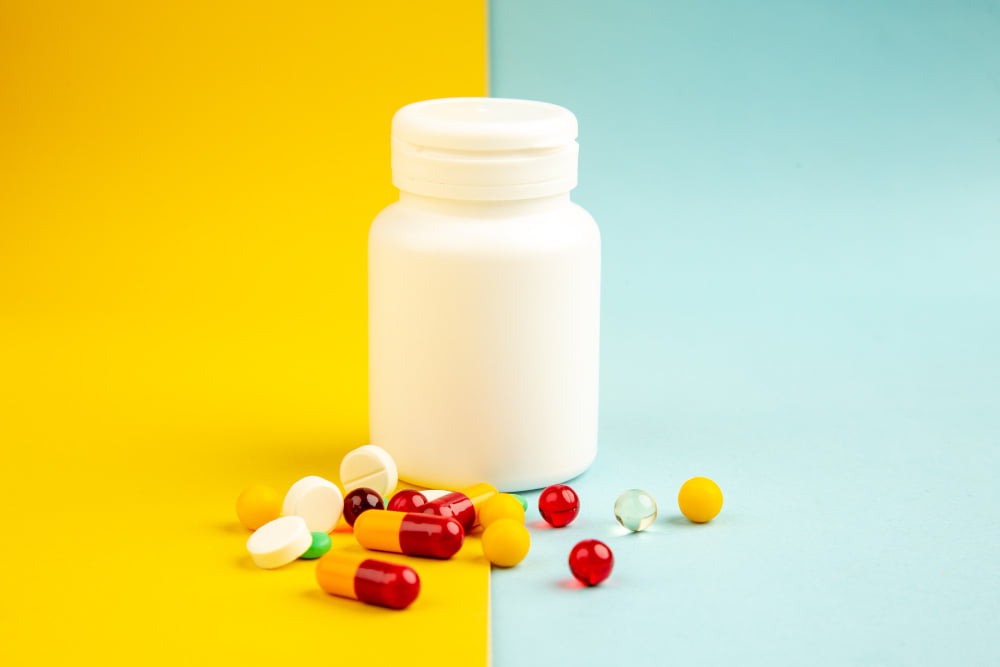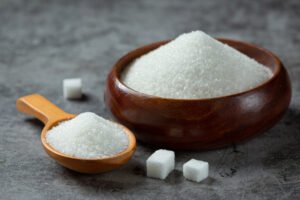FREE SHIPPING OVER $50
Top 10 Best Supplements for Bloating in 2024
In this article, we’ll explore the best supplements for bloating that can help you find relief and get back to feeling your best. We’ll also explain how they work, how to use them, and what to look out for.
Bloating is a common and uncomfortable condition that affects many people. It can make you feel like your stomach is swollen, tight, or full of gas. It can also cause pain, cramps, or nausea. Bloating can have various causes, such as eating too fast, swallowing air, eating certain foods, having food intolerances, or suffering from stress. Sometimes, bloating can also indicate an underlying digestive disorder, such as irritable bowel syndrome (IBS), inflammatory bowel disease (IBD), or small intestinal bacterial overgrowth (SIBO).
Best Supplements for Bloating

1. Digestive Enzymes
Digestive enzymes are substances that help your body break down food into smaller molecules that can be absorbed and used. They are produced by your salivary glands, stomach, pancreas, and small intestine. However, sometimes your body may not produce enough digestive enzymes, or they may not work properly. This can lead to poor digestion, malabsorption, and bloating.
Taking a digestive enzyme supplement can help you digest food more efficiently and prevent bloating. Look for a high-quality supplement that contains protease (for protein digestion), amylase (for carbohydrate digestion), and lipase (for fat digestion). You may also benefit from other enzymes, such as lactase (for lactose digestion), cellulase (for fiber digestion), or bromelain (from pineapple, for protein digestion and inflammation reduction).
2. Probiotics
Probiotics are live microorganisms that confer health benefits to your host when consumed in adequate amounts. They are often called “good bacteria” because they help balance the gut microbiota, which is the community of microorganisms that live in your digestive tract. The gut microbiota plays a vital role in your overall health. Gut microbiota affect not only your digestion but also your immunity, metabolism, mood, and more.
When your gut microbiota is out of balance, it can cause various digestive issues, including bloating. This can happen due to factors such as antibiotics, stress, poor diet, or infections. Taking a probiotic supplement or eating probiotic foods can help restore the balance of your gut microbiota and reduce bloating. Probiotics can also improve your digestion by producing enzymes, vitamins, short-chain fatty acids, and other beneficial substances.
3. Peppermint Oil
Peppermint oil is an essential oil extracted from the leaves of the peppermint plant. It has been used for centuries to soothe digestive discomfort and relieve symptoms of IBS. Peppermint oil works by relaxing the smooth muscles in your intestines, reducing spasms and cramps that cause bloating and gas. It also has anti-inflammatory and antibacterial properties that can help reduce inflammation and infection in your gut.
Look for enteric-coated peppermint oil capsules to ensure they reach your intestines intact without being broken down by your stomach acid. This will prevent any side effects such as heartburn or nausea that may occur if peppermint oil comes into contact with your esophagus or stomach.
4. Ginger
Ginger is a spice derived from the root of the ginger plant. It has been used for thousands of years as a natural remedy for various ailments, including nausea, motion sickness, colds, and arthritis. Ginger is also an effective remedy for bloating because it helps relax the gastrointestinal tract and reduce inflammation. It also stimulates the production of saliva, bile, and gastric juices, which can improve digestion and prevent gas buildup.
Consider ginger tea or ginger supplements to ease bloating after meals or whenever you feel discomfort. You can also add fresh or dried ginger to your food or drinks for extra flavor and benefits.
5. Activated Charcoal
Activated charcoal is a type of carbon that has been treated to increase its surface area and porosity. It has the ability to absorb toxins and gas in the digestive system, acting like a sponge that traps unwanted substances and prevents them from causing bloating. Activated charcoal can also help detoxify your body by binding to harmful chemicals and removing them from your system.
Take activated charcoal as needed for bloating relief, preferably before or after meals that may cause gas or indigestion. Follow the dosage instructions on the label and consult with a healthcare professional if you have any medical conditions or take any medications.
Be aware that activated charcoal can also interfere with the absorption of some nutrients, medications, and supplements, so avoid taking it at the same time as other products. It can also cause dark stools, which is normal and harmless.
6. Fennel Seeds
Fennel seeds are the dried fruits of the fennel plant, which belongs to the same family as carrots, celery, and parsley. It has natural carminative properties, meaning they help relieve gas and bloating by relaxing the intestinal muscles and expelling excess air. They also have antispasmodic and anti-inflammatory effects that can reduce cramps and pain.
Chew on fennel seeds after meals or brew fennel tea for soothing relief. You can also add fennel seeds to your food or drinks for extra flavor and benefits.
7. Turmeric
Turmeric is a spice derived from the root of the turmeric plant, which belongs to the same family as ginger. It contains curcumin, a powerful anti-inflammatory compound that can reduce gut inflammation and alleviate bloating. Curcumin can also modulate the gut microbiota and enhance the intestinal barrier function, which improves your digestive health and immunity.
Consider adding turmeric supplements or golden milk (a warm drink made with turmeric, milk, honey, and spices) to your daily routine. You can also add turmeric powder to your food or drinks for extra flavor and benefits.
Be aware that turmeric can interact with some blood thinners, anticoagulants, antiplatelets, and nonsteroidal anti-inflammatory drugs (NSAIDs), so avoid taking it at the same time as these products. It can also cause yellow stools, which is normal and harmless.
8. Chamomile Tea
Chamomile tea is an herbal infusion made from the flowers of the chamomile plant. It has calming effects on the digestive system, making it an excellent choice for reducing bloating caused by stress or anxiety. Chamomile tea can also relax the smooth muscles in your intestines, reducing spasms and cramps that cause bloating and gas. It also has anti-inflammatory and antispasmodic properties that can help reduce inflammation and pain.
Be aware that chamomile tea can cause allergic reactions in some people who are sensitive to plants in the same family, such as ragweed, chrysanthemums, marigolds, and daisies. It can also interact with some sedatives, antidepressants, blood thinners, anticoagulants, antiplatelets, and NSAIDs, so avoid taking it at the same time as these products.
9. Dandelion Root
Dandelion root is an herbal supplement derived from the root of the dandelion plant, which is often considered a weed but has many medicinal uses. It acts as a natural diuretic, promoting urine production and reducing water retention that contributes to bloating. It also helps flush out toxins from your kidneys and liver, improving your overall health.
10. Activated Charcoal
Activated charcoal is a type of carbon that has been treated to increase its surface area and porosity. It has the ability to absorb toxins and gas in the digestive system, acting like a sponge that traps unwanted substances and prevents them from causing bloating. Activated charcoal can also help detoxify your body by binding to harmful chemicals and removing them from your system.
Be aware that activated charcoal can also interfere with the absorption of some nutrients, medications, and supplements, so avoid taking it at the same time as other products. It can also cause dark stools, which is normal and harmless.
Conclusion
When dealing with bloating, it’s essential to address its underlying causes while incorporating the best supplements for bloating into your routine. Remember that individual responses may vary, so follow the dosage instructions on the label and consult with a healthcare professional before starting any new supplement regimen. Additionally, maintaining a balanced diet, staying hydrated, managing stress levels, and practicing mindful eating habits can further support your digestive health and reduce bloating.
If you found this blog post insightful, explore more by delving into our related articles:
- Top 12 Best Supplements for Kidney Health
- How to Use Moringa Seeds: From Kitchen to Skincare
- Hemorrhoid Banding: Everything You Need to Know | Procedure & Recovery
- Discover the Best Lactose Intolerance Medication Options
- Top 10 Best Hydrogen Water Bottles for 2024
- Top 10 Probiotic Foods That Help with Digestion
- Piles Self-Treatment Hacks for Quick Relief
- What is Roid Gut and How Can You Eliminate It?
- Natural Ways to Ease Ulcerative Colitis Flare-Ups
- 10 Natural Ways to Lower Cortisol Levels: Reclaim Your Peace








I got this web page from my buddy who informed me regarding this website and now
this time I am visiting this site and reading very informative articles or reviews at this time.